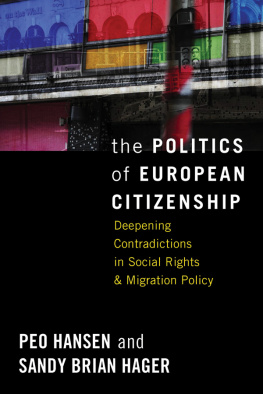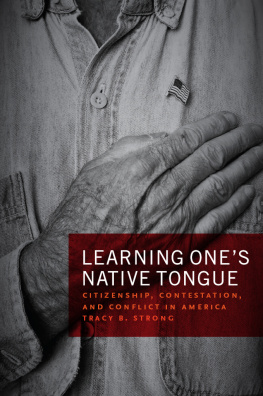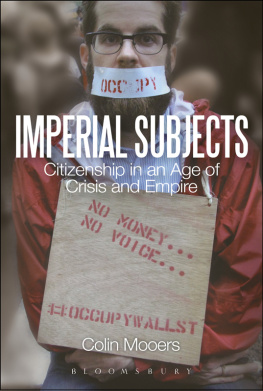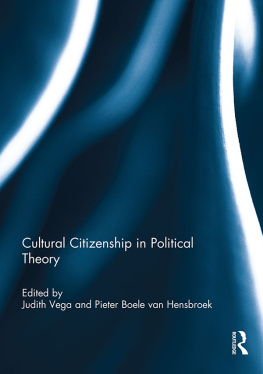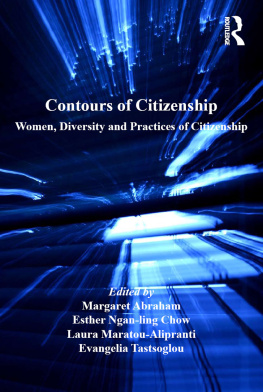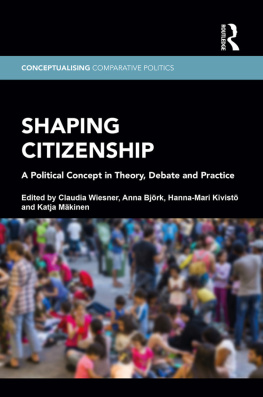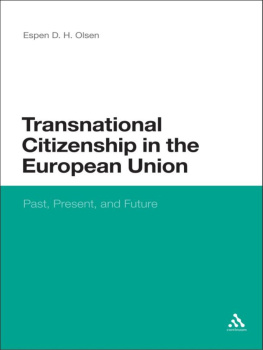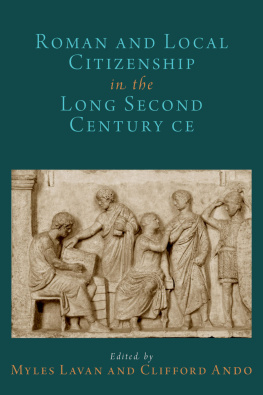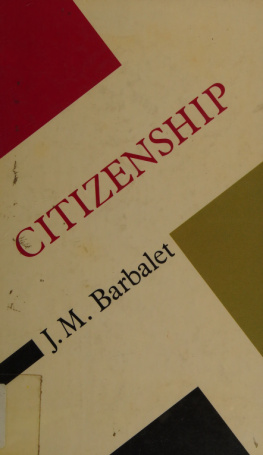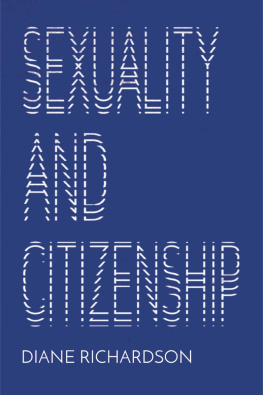
CITIZENSHIP, INEQUALITY, AND DIFFERENCE
THE LAWRENCE STONE LECTURES
Sponsored by:
The Shelby Cullom Davis Center for Historical Studies and Princeton University Press
A list of titles in this series appears at the back of the book.
Citizenship, Inequality, and Difference
HISTORICAL PERSPECTIVES

Frederick Cooper
PRINCETON UNIVERSITY PRESS
PRINCETON & OXFORD
Copyright 2018 by Princeton University Press
Published by Princeton University Press,
41 William Street, Princeton, New Jersey 08540
In the United Kingdom: Princeton University Press,
6 Oxford Street, Woodstock, Oxfordshire OX20 1TR
press.princeton.edu
All Rights Reserved
ISBN 978-0-691-17184-5
LCCN 2017958892
British Library Cataloging-in-Publication Data is available
Editorial: Brigitta van Rheinberg and Amanda Peery
Production Editorial: Debbie Tegarden
Jacket art courtesy of Shutterstock
Production: Erin Suydam
Publicity: James Schneider
Copyeditor: Jodi Beder
This book has been composed in Miller
Printed on acid-free paper.
Printed in the United States of America
10 9 8 7 6 5 4 3 2 1
CONTENTS
PREFACE
THIS BOOK ORIGINATES in the Lawrence Stone Lectures, sponsored by the Davis Center for Historical Studies of Princeton University and Princeton University Press. They were delivered in April 2016. There is nothing like preparing for well-publicized lectures before an audience of highly accomplished scholars to add an element of fear to the usual inducements to intellectual initiative. In speaking before an audience of historians who covered all time periods and all parts of the globe, I sought to look beyond my own area of specialization in the history of French Africa. This self-imposed task took me to many places where I was skating on very thin ice. The lectures were based less on my research than on making the connection between issues that came up in my work and a wider and more varied literature. The Princeton audience was as courteous as it was intellectually rigorous, so this project benefitted greatly from the route it took from conception to book.
Freed in the book version from the constraint of packing 2000 years of globe-spanning history into three fifty-minute lectures, I have elaborated on important points and, in the notes, given credit where credit is duewhich is essentially everywhere. But I have tried not to stray too far from the idea of the Lawrence Stone Lectures, turning the lecture format into a reflective essay. This is not a comprehensive study of citizenship in world history. It is a small book on a big topic, and if it provokes more questions than it answers, then it will have met one of my goals. It is an engagement with some essential themes in the study of citizenshipin past and presentand it relies on select examples. The nature of the topic means crossing different literatures, not just the divisions of the historical profession by time and place, but ventures into political theory, legal studies, sociology, and anthropology.
For me, and I hope for the reader, one of the most stimulating challenges of the project was to put the political ethnography and history of Africa into conversation with other historical domains and to explore the confrontation of polities whose conception of political belonging were quite different. Each of these domains has been the life work of excellent scholars, and if coming to grips with any one of them entails simplification, bringing them into conversation offers possibilities of thinking across time and space, as many political actors and thinkers have done across the centuries.
Fortunately, when I was preparing the lectures, I had the benefit of the support of two institutions that gave me time and resources to undertake extensive reading and reflection. During the academic year 201516, I was a fellow of the research group on Labor and Life Course in Global History, more commonly known as re:work, at the Humboldt University in Berlin. I profited greatly from the insights of my fellow fellows, of the director Andreas Eckert, and of other scholars in Berlin associated with re:work. The staff, ably led by Felicitas Hentschke, provided much more than the support that I and the other fellows needed to get our work done; they also provided a congenial and stimulating atmosphere. My second home in Berlin was the Wissenschaftskolleg zu Berlin, where my spouse Jane Burbank was a fellow. Wiko, as it calls itself, is as kind to partners as it is to fellows, with the added benefit of imposing no obligations. Since I did much of my work in our apartment in the Wiko complex, I made extensive use of the Wiko library services. The librarians fetched books from libraries all around Berlin and beyond. I am very grateful to the head librarian, Sonja Grund, and her staff for meeting my extensive demandsprobably as great as those of any of the official fellowswith the utmost courtesy and efficiency. And a word of thanks to the rector Luca Giulianiand through him the rest of the Wiko stafffor making this such a supportive place to work. I would also like to thank members of the Wiko community for many enlightening conversations, and particularly a group of them who let me present to them a dress rehearsal for the three lectures and gave me usefuland occasionally sharpfeedback that improved the clarity of the lectures and of this book: Michael Gordin, Erika Milam, Hassan Jabareen, Rina Rosenberg, and Jane Burbank. I also received helpful comments from a presentation of some of my lecture material to the re:work fellows shortly before the Princeton lectures, and I benefitted from many conversations at re:work throughout the year.
I am very grateful to my hosts at Princeton for inviting me and organizing every aspect of the lectures in thoughtful way. I was first approached by Brigitta van Rheinberg, Director of Global Development and History Publisher at the Press, whom I already knew from preparing the book Empires in World History that I coauthored with Jane Burbank. I appreciate her confidence in me and am grateful for her encouragement to take on a topic that strayed well beyond my comfort zone. Philip Nord, head of the Davis Center, was also responsible for the invitation and was a thoughtful host in Princeton as well as an insightful critic. Brigitta, Phil, and Adam Beaver gave me warm introductions at the three lectures and were excellent companions throughout the visit. I am most of all grateful to members of the Princeton faculty, graduate students, and visitors who attended lectures at a busy time of the yearin many cases all three of them on consecutive daysand whose questions and comments were extremely helpful in the writing of this book. The next to last draft of the introduction benefitted from a close reading at a seminar with the Global Studies Center of the University of Pittsburgh. Over the years, different aspects of my work on citizenship, especially in relation to French Africa, have been presented at many conferences and lectures, and discussions of these presentations have influenced the present publication. The two anonymous readers for the Press provided very helpful comments for the final round of revisions. Danielle Beaujon meticulously checked the accuracy of footnotes and quotations. A special word of thanks to Jane Burbank for her careful and sensitive reading of the manuscript of this book.
Translations of quotations from French sources are my own unless otherwise noted.
Next page


